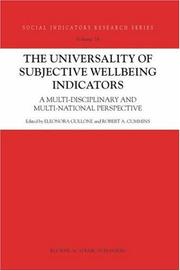| Listing 1 - 4 of 4 |
Sort by
|

ISBN: 070994859X Year: 1988 Publisher: London Croom Helm
Abstract | Keywords | Export | Availability | Bookmark
 Loading...
Loading...Choose an application
- Reference Manager
- EndNote
- RefWorks (Direct export to RefWorks)
Child. --- Infant. --- Brain Damage, Chronic. --- Brain Damage, Chronic --- Brain damaged children --- -Brain-damaged children --- -Brain-injured children --- Brain damage --- Developmentally disabled children --- Pediatric neurology --- Chronic Encephalopathy --- Encephalopathy, Chronic --- Chronic Brain Damage --- Infants --- Children --- Minors --- therapy. --- Rehabilitation --- -Evaluation --- Patients --- -therapy. --- Brain-damaged children --- Child --- Infant --- Brain-injured children --- Rehabilitation&delete& --- Evaluation --- therapy
Book
ISBN: 110868033X 1108575366 1108685587 1108461697 9781108461696 9781108685580 Year: 2018 Publisher: Cambridge, England : Cambridge University Press,
Abstract | Keywords | Export | Availability | Bookmark
 Loading...
Loading...Choose an application
- Reference Manager
- EndNote
- RefWorks (Direct export to RefWorks)
The scientific study of 'wellbeing' involves both objective and subjective variables. While objective wellbeing can be simply measured as tangible aspects of the living environment, measuring subjective wellbeing involves quantifying self-reported feelings. Although reliable and valid measures can be achieved, in a cross-cultural context differences in language and culture present formidable challenges to measurement comparability. This Element begins by describing the behaviour of subjective wellbeing in single cultures, using the theory of homeostasis. Robert A. Cummins then discusses cross-cultural differences in subjective wellbeing, with a focus on measurement invariance as a means of ensuring the validity of comparative results. Cummins proposes that the major barrier to creating such comparability of measurement is a pervasive response bias that differs between cultures. He concludes that current instruments are inadequate to provide valid cross-cultural measures of subjective wellbeing, and that suitable measures may be created as short forms of current scales.
Quality of life. --- Well-being. --- Quality of life --- Well-being --- Research. --- Well-being - Cross-cultural studies --- Happiness - Cross-cultural studies --- Well-being - Research - Methodology --- Happiness - Research - Methodology --- Happiness --- Research --- Methodology.
Multi
ISBN: 9781108685580 9781108461696 1108461697 Year: 2018 Publisher: Cambridge: Cambridge university press,
Abstract | Keywords | Export | Availability | Bookmark
 Loading...
Loading...Choose an application
- Reference Manager
- EndNote
- RefWorks (Direct export to RefWorks)
The scientific study of 'wellbeing' involves both objective and subjective variables. While objective wellbeing can be simply measured as tangible aspects of the living environment, measuring subjective wellbeing involves quantifying self-reported feelings. Although reliable and valid measures can be achieved, in a cross-cultural context differences in language and culture present formidable challenges to measurement comparability. This Element begins by describing the behaviour of subjective wellbeing in single cultures, using the theory of homeostasis. Robert A. Cummins then discusses cross-cultural differences in subjective wellbeing, with a focus on measurement invariance as a means of ensuring the validity of comparative results. Cummins proposes that the major barrier to creating such comparability of measurement is a pervasive response bias that differs between cultures. He concludes that current instruments are inadequate to provide valid cross-cultural measures of subjective wellbeing, and that suitable measures may be created as short forms of current scales
Well-being --- Happiness

ISBN: 1402010443 9401039607 9401002711 Year: 2002 Volume: 16 Publisher: Dordrecht : London : Kluwer Academic,
Abstract | Keywords | Export | Availability | Bookmark
 Loading...
Loading...Choose an application
- Reference Manager
- EndNote
- RefWorks (Direct export to RefWorks)
This book is concerned with the universality of wellbeing indicators. It provides contributions from international scholars in the field of quality of life and subjective well-being. The book provides substantial conceptual coverage on issues relating to the universality of subjective wellbeing including detailed discussion of central underlying mechanisms and processes involved in subjective wellbeing. The main topics covered include: the theoretical bases for the measurement of quality of life, the affective dimension in quality of life, the roles of homeostasis and personality in the processes of quality of life assessment and maintenance, the impact of factors including residential care, economic wealth, and work-related variables on subjective wellbeing. The book is of interest to all who want to develop their understanding of the universality, assessment, development and maintenance of subjective wellbeing.
Quality of life --- Qualité de la vie --- Research --- Methodology. --- Statistical methods --- Cross-cultural studies --- Recherche --- Méthodologie --- Méthodes statistiques --- Etudes transculturelles --- Maatschappelijke werk 36 --- Economische indicatoren 338.12:311.141 --- Maatschappelijke ontwikkeling 304 --- Milieu 504.7 --- Duurzame ontwikkeling 502.31 --- Sociale agogiek --- Statistical methods. --- welzijnswerk en maatschappelijke dienstverlening --- welzijnswerk en maatschappelijke dienstverlening. --- Qualité de la vie --- Méthodologie --- Méthodes statistiques --- Life, Quality of --- Research&delete& --- Methodology --- Economic history --- Human ecology --- Life --- Social history --- Basic needs --- Human comfort --- Social accounting --- Work-life balance --- Sociology. --- Quality of life. --- Psychopharmacology. --- Philosophy. --- Sociology, general. --- Quality of Life Research. --- Philosophy, general. --- Mental philosophy --- Humanities --- Behavioral pharmacology --- Drugs --- Chemotherapy --- Pharmacology --- Psychotropic drugs --- Social theory --- Social sciences --- Psychotropic effects
| Listing 1 - 4 of 4 |
Sort by
|

 Search
Search Feedback
Feedback About UniCat
About UniCat  Help
Help News
News